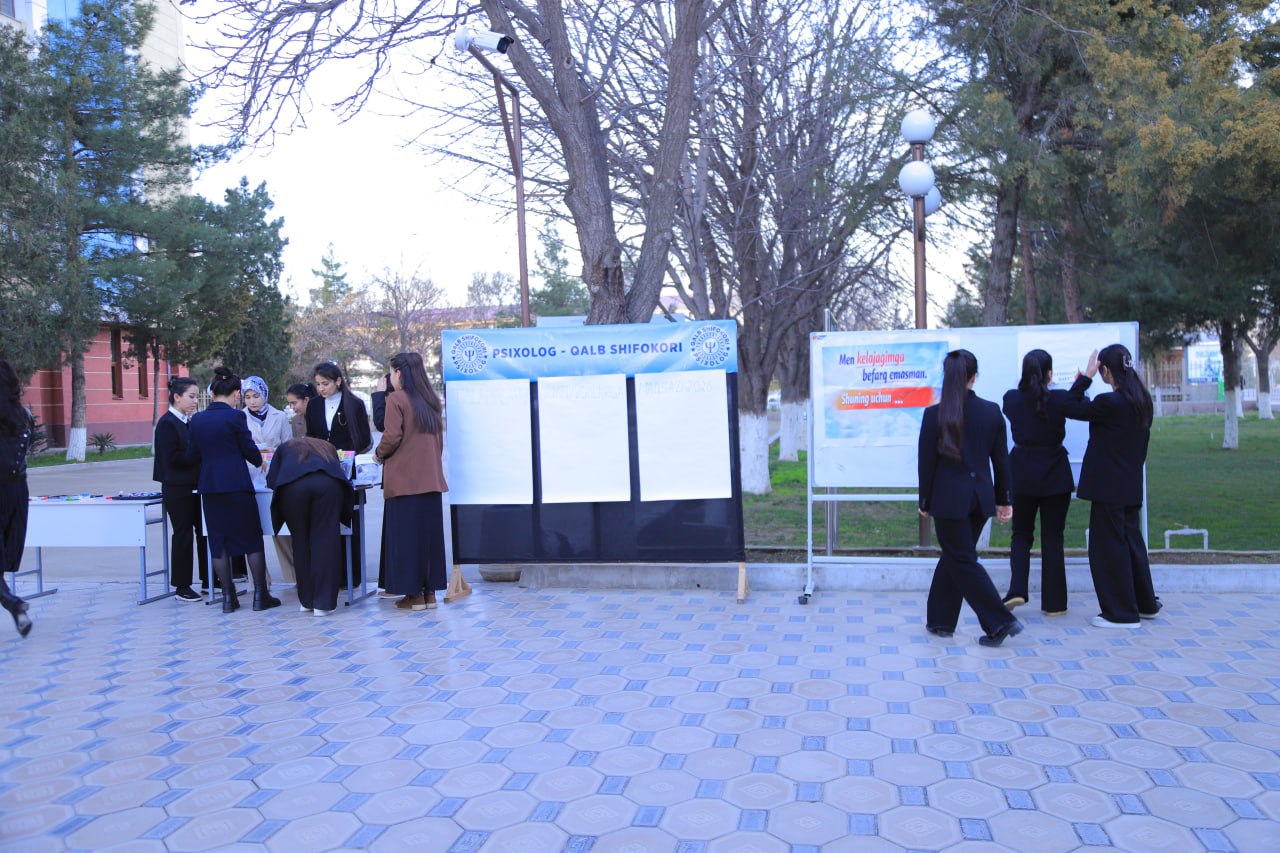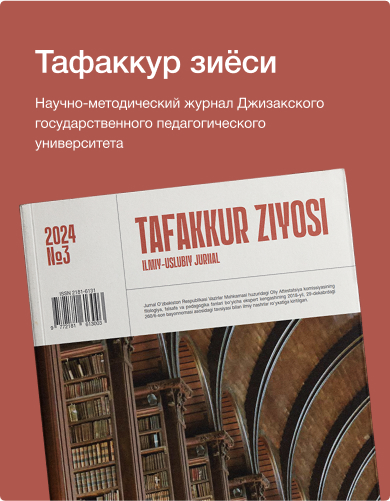QAMBAROV SANJAR, NURMATOV KAMOL JURAKULOVICH,
TAYLANOV NIZOM ABDURAZZAKOVICH, RAJABOV MUHAMMAD KARIMOVICH
Jizzakh State Pedagogical University
Sharof Rashidov, 4, Jizzakh 130100, Uzbekistan
Email: sanjarqambarov01@gmail.com
ABSTRACT
In this article bases of formation of the purposes of ecological education are discussed. The goals of education stem from universal ideals, national traditions and the social order of society to the education system in specific conditions. Goals allow specifying the stages and means of achieving a given result – the formation of an ecological culture. The continuity of science is achievable only with a high level of education. Science and education are closely linked. On the one hand, the development of science is possible only with a high quality of education, on the other hand, the level of development of science determines the quality of education itself. The state of the environment also depends on the results of environmental education. The effectiveness of environmental education is largely determined by the readiness of environmental teachers for professional activities, which means the ability to solve professional problems and problems that arise in the real conditions of the educational process. The professional competence of an environmental teacher is based on the synthesis of acquired environmental, pedagogical and methodological knowledge, skills and abilities necessary to solve professional problems.
Keywords: formation of ecological culture, training and education, environmental education
СОДЕРЖАНИЕ ЭКОЛОГИЧЕСКОГО ОБРАЗОВАНИЯ В ОБЩЕОБРАЗОВАТЕЛЬНОЙ ШКОЛЕ
КАМБАРОВ САНЖАР, НУРМАТОВ КАМОЛ ДЖУРАКУЛОВИЧ,
ТАЙЛАНОВ НИЗОМ АБДУРАЗЗАКОВИЧ, РАДЖАБОВ МУХАММАД КАРИМОВИЧ
Джизакский государственный педагогический университет
Шароф Рашидова , 4, Джизак 130100, Узбекистан
Электронная почта: sanjarqambarov01@gmail.com
АННОТАЦИЯ
В статье обсуждены основы формирования целей экологического образования. Цели образования вытекают из общечеловеческих идеалов, национальных традиций и социального устройства общества в систему образования в конкретных условиях. Цели позволяют конкретизировать этапы и средства достижения заданного результата – формирования экологической культуры. Преемственность науки достижима только при высоком уровне образования. Наука и образование тесно связаны. С одной стороны, развитие науки возможно только при высоком качестве образования, с другой стороны, уровень развития науки определяет качество самого образования. Состояние окружающей среды также зависит от результатов экологического образования. Эффективность экологического образования во многом определяется готовностью педагогов-экологов к профессиональной деятельности, а значит, умением решать профессиональные задачи и задачи, возникающие в реальных условиях образовательного процесса. Профессиональная компетентность педагога-эколога основана на синтезе приобретенных эколого-педагогических и методических знаний, навыков и умений, необходимых для решения профессиональных задач.
Ключевые слова: формирование экологической культуры, обучение и воспитание, экологическое образование
UMUMIY TA’LIM MAKTABLARIDA EKKOLOGIK TA’LIM MAZMUNI
QAMBAROV SANJAR, NURMATOV KAMOL JURAKULOVICH,
TAYLANOV NIZOM ABDURAZZAKOVICH, RAJABOV MUHAMMAD KARIMOVICH
Jizzax davlat pedagogika universiteti
Sharof Rashidov , 4, Jizzax 130100, O‘zbekiston
Elektron pochta: sanjarqambarov01@gmail.com
ANNOTATSIYA
Maqolada ekologik tarbiya maqsadlarini shakllantirish asoslari muhokama qilingan. Ta’limning maqsadlari umuminsoniy g’oyalar, milliy an’analar va jamiyatning ijtimoiy tartibidan muayyan sharoitlarda ta’lim tizimiga kelib chiqadi. Maqsadlar berilgan natijaga erishish bosqichlari va vositalarini – ekologik madaniyatni shakllantirish imkonini beradi. Ilm-fanning uzluksizligiga faqat yuqori darajadagi ta’lim bilan erishish mumkin. Fan va ta’lim bir-biri bilan chambarchas bog’liq. Bir tomondan ilm-fan rivoji faqat yuqori sifatli ta’lim bilan mumkin bo‘lsa, ikkinchi tomondan fanning rivojlanish darajasi ta’lim sifatini o‘zi belgilaydi. Atrof-muhitning holati ekologik ta’lim natijalariga ham bog’liq. Ekologik ta’lim samaradorligi ko’p jihatdan ekologiya o’qituvchilarining kasbiy faoliyatga tayyorligi bilan belgilanadi, bu esa o’quv jarayonining real sharoitida yuzaga keladigan kasbiy muammolar va muammolarni hal qilish qobiliyatini anglatadi. Ekologik o’qituvchining kasbiy kompetensiyasi kasbiy muammolarni hal qilish uchun zarur bo’lgan o’zlashtirilgan ekologik, pedagogik va uslubiy bilim, ko’nikma va ko’nikmalarning sinteziga asoslanadi.
Kalit so‘zlar: ekologik madaniyatni shakllantirish, ta’lim va tarbiya, ekologik ta’lim
INTRODUCTION
In a pedagogical university, students first study environmental and pedagogical disciplines, and then the theory and methodology of teaching ecology. And this is not accidental, since the content of the academic discipline “Theory and Methods of Teaching Ecology” is formed at the intersection of sciences – first of all, ecology, pedagogy and psychology. Currently, environmental problems significantly affect all spheres of people’s lives: science and production, politics and economy, energy, urban planning, health care and education. Ecology creates a methodological basis for predicting the consequences of intervention in natural systems, for the synthesis of scientific knowledge and social experience, for studying the possibilities of science and practice to intelligently solve environmental problems.
New facts lead to a reassessment of existing ideas, and old concepts and theories are replaced by new ones. The continuity of science is achievable only with a high level of education. Science and education are closely linked. On the one hand, the development of science is possible only with a high quality of education, on the other hand, the level of development of science determines the quality of education itself. The state of the environment also depends on the results of environmental education. The effectiveness of environmental education is largely determined by the readiness of environmental teachers for professional activities, which means the ability to solve professional problems and problems that arise in the real conditions of the educational process.The professional competence of an environmental teacher is based on the synthesis of acquired environmental, pedagogical and methodological knowledge, skills and abilities necessary to solve professional problems.
Ecology is a unique phenomenon in modern science. It manifests such scales of generalization, which are achieved only in a few areas of knowledge. Knowledge in the field of ecology is extremely diverse and multifaceted: from specific information about the practice of nature management to philosophical and ideological generalizations that reveal the patterns of interaction between society and nature. The generalizing nature of the results, the significant methodological and theoretical basis of ecology put it at the center of the integration of scientific knowledge. Currently, the boundaries of environmental studies have expanded significantly and include social ecology, philosophy of ecology, philosophy of socioecology and anthropoecology, environmental ethics and aesthetics, pedagogical and professional ecology. Modern ecology is a complex system of interrelated sciences. At the present stage of development, the boundaries of ecology have expanded from studies of the “organism-environment” system to the “society-biosphere” system.
Ecology is especially valuable because it is a future-oriented science based on the principle that the values of the future are no less important than the values of the present. The mutual simultaneous development of general ecological and particular ecological concepts determines the complication of the structure and content of science.
Ecology is the most important source of scientific outlook, and the world is comprehended in the process of scientific knowledge and in the process of education. Ecology has a significant impact on the education system as a whole, manifested in the reorientation of the goals of education and the renewal of its content, and serves as a source of environmental education for schoolchildren.
The theory and methodology of teaching ecology are inextricably linked with the science of ecology. Ecology forms the content of environmental education, and the methods of environmental research are largely reflected in the educational and research activities of students. At the same time, the content of environmental education is not a reduced copy of the science of ecology, since the school course should contain only the most important, taking into account the age characteristics of students, pedagogically adapted environmental facts, concepts, laws and patterns.
The connection between the theory and methods of teaching ecology and psychology. The theory and methodology of teaching ecology are closely related to psychology, which explores the development of the individual in the learning process, studies the psychological foundations of training and education at different levels of education, reveals the features of the development of various psychological processes, the mechanism for the formation of interests, motives, etc.
Ecological psychology forms ideas about the laws and mechanisms of development of the ecological consciousness of the individual, on the basis of which the theory and methodology of teaching ecology develops the corresponding specific principles and methods of pedagogical management of the process of development of mental activity of students. Connection of the theory and methods of teaching ecology with pedagogy.
Pedagogy determines the general pedagogical patterns, principles and organizational forms that are used to solve the problems of environmental education.
The theory and methods of teaching ecology are directly related to the theory of education, which pedagogically interprets the requirements of society for the professional activities of an environmental teacher, for the development of the student’s personality. Taking into account social requirements, on the basis of the theory of education, educational goals are formed, which are reflected in the selection of the content of environmental education. Based on the provisions of the theory of education, the place and functions of the student’s educational activity are determined. Methods and organizational forms of teaching ecology are developed in unity with the methods and techniques of education.
RESULTS AND ITS DISCUSSIONS
The theory and methodology of teaching ecology are directly and closely related to didactics. The task of didactics is to ensure the requirements for the selection of content, to determine the ways and means of educational work in ecology. Didactics is traditionally defined as a relatively independent part of pedagogy that studies the content, patterns, principles and methods of teaching, as a general theory and teaching methodology. It is designed to provide answers to the key questions of educational practice: why teach? (i.e. what are the goals and values of education). In other words, didactics makes it possible to clarify what the study of ecology gives in achieving educational goals at school. With the help of didactics, it is possible to determine: what to teach (i.e. what should be the content of training). Based on didactic patterns within the framework of the methodology, it is possible to establish how to teach effectively (i.e., what teaching methods, techniques and technologies can achieve the planned result).
Pedagogy and didactics offer general patterns for constructing the educational process in ecology, and the methodology determines the choice of specific forms, methods, techniques and means of teaching ecology. The theory and methods of teaching ecology characterize the main forms and methods of teaching, study the ways in which the teacher achieves the best results with the least expenditure of time and effort, ensuring that all the requirements for teaching ecology at school are met. Skillful construction of the lesson, the use of a variety of methods save the time and effort of the teacher and student. Therefore, the study of forms, methods and means of teaching ecology is essential in improving the perception, understanding and assimilation of knowledge and skills by students. For effective work, it is not enough for a teacher to be well-informed; he must possess a system of methodological knowledge and skills. In turn, the theory and methodology of teaching ecology serve as one of the sources for the development of didactics itself.
It is also relevant to decide who and where to train, how to create conditions for effective learning? All these questions are inseparable from each other, must be considered in close connection and serve to successfully solve the problems of training and education. The theory and methodology of teaching ecology, as well as didactics, are looking for answers to all these questions in accordance with a specific understanding of the goals and values, and the characteristics of the content of environmental education for schoolchildren. Belonging of the theory and methods of teaching ecology to the pedagogical sciences. As an independent area of scientific knowledge, the theory and methodology of teaching ecology have their own object and subject of research, have their own methodology (a set of research methods) and terminological apparatus. In the theory of teaching ecology, regularities and principles of teaching and educating students are established.
The object of methodological research is the system of environmental education and all its components. The subject of research can be any of the aspects of the object: goals, content, forms, methods, means of teaching ecology and environmental education of schoolchildren. In researching the problems of environmental education, general scientific methods and methods widely used in pedagogical research are used: pedagogical observation, pedagogical experiment, testing, interviewing, questioning, rating assessment. Methods of pedagogical research are a set of techniques and operations aimed at studying pedagogical phenomena and solving various scientific problems of an educational nature.
The terminological apparatus used in the field of studying the problems of environmental education includes such pedagogical concepts as “teaching and educational process in ecology”, “forms of teaching ecology”, “methods of teaching ecology”, “methods of education”, “means of teaching ecology”, ” pedagogical technologies”, etc. The specificity of the content of these terms is determined by the characteristics of the subject content, i.e. content of environmental education.
So, the object, subject and methods of research, scientific terms used in the methodology of teaching ecology, are pedagogical in their essence. Therefore, there are good reasons to attribute the theory and methodology of teaching ecology to pedagogical sciences.
The concepts of “theory of teaching ecology” and “methods of teaching ecology”. The name of the scientific discipline “Theory and methods of teaching ecology” (as well as the academic discipline at the university) was due to the fact that the study and scientific organization of the process of teaching ecology can be considered at two levels: theoretical and methodological. The theory of teaching ecology includes patterns and principles for the selection of content and the choice of teaching methods, the theory of forms, methods and means of teaching ecology, the theory of the development of ecological concepts.
The regularities established in the theory of teaching ecology manifest themselves as the dependence of the selection of content on the goals of biological education, the selection of the content of the lesson on the tasks of the lesson, the dependence of the choice of methods on the content of the developed concepts, the dependence of the choice of teaching aids on the methods and stages of the lesson, etc.
At the methodological level, effective methods and means of developing concepts or skills are determined, the optimal combination of these methods and teaching aids is identified, as well as conditions that contribute to the successful solution of educational problems in ecology.
The methodology of teaching ecology can also be considered as creativity, in which the personality of the teacher, his pedagogical culture, professionalism, erudition, and tact play a huge role. The transition to a personal model of pedagogical education determines a new quality of training for future environmental teachers, which means a transition from knowledge to a personal and author’s model of pedagogical activity. The value-target orientation of methodological training contributes to the creation of author’s methods in the field of environmental education of schoolchildren.
Ecology as an independent academic subject is not included in the federal component of the basic curriculum of a general education school. Ecology is included only in the school component, and therefore, as a separate independent subject, ecology is taught only in some schools, which does not contribute to the implementation of the idea of compulsory, universal and continuous environmental education. Nevertheless, the professional activity of an environmental teacher is widely in demand in terms of environmental education in any model of its construction (one-subject, multi-subject, mixed) in a general education school, in the system of additional education, in institutions of primary and secondary vocational education.
At the present stage of the development of society, pedagogical activity acquires a systemic and holistic character. A teacher in the field of environmental education must master ecology not only as a subject area, but also as a specific area of culture, to which he is ready to introduce his students.
The activity of the teacher is based on the knowledge and skills of how to implement the future, not yet implemented in reality, the educational process. In order to act as a subject of pedagogical activity, the teacher must master pedagogical attitudes aimed at developing the personality of the student. In addition, the teacher-ecologist should be able to design his own pedagogical activity, based on his own pedagogical experience.
The structure of the qualification characteristics of the teacher-ecologist includes such indicators as readiness:
- to solve various professional problems in the conditions of real practice of an educational school;
- design the content of environmental education within the framework of the basic curriculum of general educational institutions;
- train and educate students, taking into account the specifics of environmental knowledge and types of environmental activities;
- to promote the formation of a general and environmental culture among students, their preparation for a conscious choice of a profile and subsequent education in a specialized school;
- use a variety of techniques, methods and means of teaching ecology;
- ensure the level of training of schoolchildren that meets the requirements of the state educational standard;
- use modern technologies for collecting and processing experimental data in accordance with the problem of research in the field of environmental education.
Education can be considered both as a process, and as a result, and as a system. It reflects the process of mastering the system of knowledge, skills, experience of practical, cognitive and creative activity by the personality, as well as the process of formation of value relations, views and beliefs.
At present, ecological culture is becoming not something desirable, but a strictly obligatory requirement of life in the world community. Introduction to ecological culture is strictly necessary not only for the citizens of each country, but also for humanity as a whole. Ecological culture is a part of culture that determines the compliance of social activity with the requirements of the vitality of the natural environment. In environmental education, the selection of educational content takes place in a new way, since it is characterized by the principle of “new synthesis”, which has a special methodological significance (i.e., the synthesis of all human knowledge about nature, knowledge on the conservation and optimization of the environment).
Environmental education should be prognostic directed , related to the care of nature and the preservation of living conditions for future generations of people; it reassesses the effectiveness of educational systems. In addition to knowledge, skills and abilities, the assessment of the results of environmental education should include actions to preserve and improve the quality of the environment, as well as the value attitude of students to nature.
Environmental education as a system is a set of educational programs, state educational standards and educational institutions implementing them. The structure of the environmental education process. Currently, in the structure of the process of environmental education, the following are conditionally singled out:
- environmental education is a purposeful process, including the formation of a system of general environmental, socio -ecological and applied knowledge, as well as the development of methods and types of environmental activities and the ability to apply this knowledge in practice;
- environmental education – the formation of students ‘ attitudes , views, beliefs and norms of behavior, characterized by emotional and moral, careful and responsible attitude to nature;
- environmental education is a continuous process of formation of public consciousness of the ecological type on the basis of activation, expansion and maintenance of interest in environmental problems in society. This is a process of dissemination of environmental knowledge and environmental information, increasing the environmental awareness of the population in matters of environmental safety and environmental protection.
CONCLUSION
The requirements for the personality of an environmental teacher are based on the understanding that a person’s personality is a free and developing system; from the recognition of the humanistic and culturological essence of environmental education and the priority development of those personality traits that are important from the point of view of professional significance. For a teacher in the field of environmental education, such qualities as criticality, independence and flexibility of thinking, creative activity and individuality, purposefulness, a developed sense of justice, exactingness and responsibility, sensitivity and goodwill in dealing with people are important. At present, the need for continuous education and self-education is of particular importance for the teacher.
REFERENCES
- Alekseev S. V. We study ecology – experimentally. Workshop on environmental assessment of the state of the environment. M. Becker. – SPb ., 1993.
- Andreeva N.D. The system of environmental and pedagogical education st u – dentov – biologists in a pedagogical university. – SPb ., 2000.
- Geography and ecology of St. Petersburg and the Leningrad region: textbook . posobie for 8 – 9 grades of a general education school. ed. S.V.Vasilyeva, O.V.Gavrilova. – M., 2006.
- Glazachev S.N. Ecological culture. S.N. Glazachev, O.N. Kozlova. – M,
1997.
- Davydov VV Problems of developing education: experience of theoretical and experimental psychological research. – M., 1986.
- Deryabo S.D., Yasvin V.A. Ecological pedagogy and psychology. S.D.Deryabo , V.A.Yasvin . – Rostov – n / D., 1996.
Zagvyazinsky V.I. Learning Theory: Modern Interpretation. – M., 2001.
- Klarin M.V. Innovations in teaching: metaphors and models: An analysis of foreign experience. – M., 1997.
- The concept of school environmental education. ed. I. D. Zvereva, I. T. Suravegina . – M., 1994.
- Makhmutov M.I. Organization of problem-based learning in wToable – M& , 3997.
- Moiseev N.N. Ecology and education. – M., 1996. Nazarova T. S. Teaching aids: technology of creation and use. T. S. Nazarova, E. S. Polat .
M., 1998.





